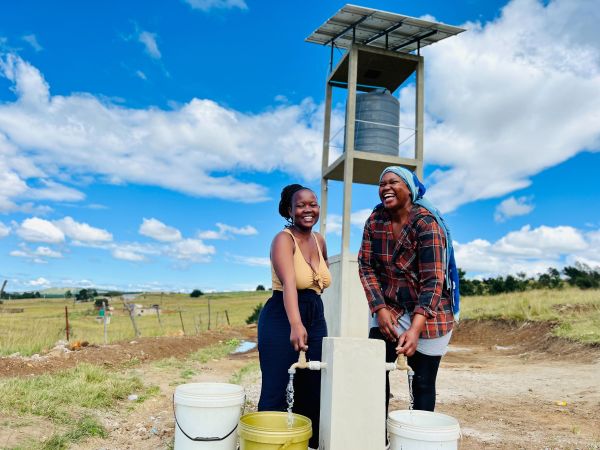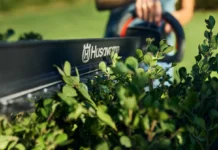How rural communities are reaping the rewards of clean water access
Just 20 minutes from Kruger Gate Hotel, in the heart of Mpumalanga, thousands of community members in rural villages are gaining access to something that many take for granted: clean, reliable water. Through a strategic partnership with non-profit organisation Innovation: Africa and under the support of the Cork Trust, Kruger Gate Hotel is helping to fund and facilitate solar-powered water systems that provide a lifeline to families who have long relied on river water or distant, seasonal wells.
With approximately 90% of Kruger Gate Hotel’s staff residing in the surrounding villages, the team became acutely aware of the daily challenges faced by these communities—particularly the water scarcity that forces women and children to walk long distances for a single bucket of often unsafe water. These journeys not only pose serious health risks but also place individuals in vulnerable situations. This local insight was a key driver behind the hotel’s involvement in the project: a commitment to safeguarding the wellbeing of the people who form the heart of the community.
One of the most impactful projects to date has taken place in the twin villages of Belfast Borhana and Belfast Borhana 1. These neighbouring communities, with a combined population of over 6000 people, were selected for a cluster project: an innovative model that allows a high-yielding borehole drilled in one village to supply water to both. In October 2023, drilling at Belfast Borhana yielded an impressive 1.6 litres of water per second. The borehole was fitted with a solar-powered pump and storage system, and water is now distributed across the area via 2,950 metres of piping and 20 communal taps, reaching residents in a four-kilometre radius.
What sets this project apart is not only the infrastructure but the way in which it was built. From the outset, community members were deeply involved in every stage of the process. Ten local residents were hired and trained by contractors in a variety of construction skills—from bricklaying and trenching to scaffolding and pipe installation. These workers, paid in accordance with South Africa’s minimum wage, also received medical fitness exams and formal training in construction safety. Upon completion, each trainee was awarded a certificate to help bolster their future employment prospects, adding a valuable skills development component to the project’s long-term impact.
Sustainability remains central to the initiative’s success. A local water committee, elected from within the community, has been established to manage and maintain the system. With support from Innovation: Africa, the committee opens a bank account and collects monthly household contributions that are used to fund basic maintenance, pay a security guard to protect the 10-metre water tower, and ensure that the infrastructure remains in good condition for years to come. The project is further supported by a UN award-winning remote monitoring unit that tracks water and energy usage in real-time, offering full transparency to all stakeholders.
While the Belfast Borhana project is already delivering tangible benefits, progress continues at pace in another nearby community. Saringwa Village, which is home to around 2000 residents, is currently in the drilling phase of a similar solar-powered water system. Located along the Sabie River, this community has historically relied on river water for drinking, cooking, and farming; posing significant health risks, especially for children. Thanks to the intervention, plans are underway to construct two towers and up to ten communal taps across the village, with completion expected by August 2025.
These processes begin with careful stakeholder engagement. The team works closely with the local Water Services Authority (WSA), which is mandated by the Water Services Act to provide oversight and ensure regulatory compliance. A Memorandum of Understanding (MOU) is signed with the WSA, and ward councillors are involved to help facilitate training, infrastructure checks, and community mobilisation. In parallel, the team engages with the Traditional Authority, whose support is essential for access to communal land and for ensuring buy-in from village leaders. Chiefs and Indunas assist in identifying priority communities and in setting up water committees, helping to instill a sense of shared ownership and long-term responsibility.
Community education and empowerment are cornerstones of the model. Each village forms a steering committee that undergoes training to understand the workings of the water system. These committees are responsible for selecting and paying local operators and guards, collecting maintenance contributions, and acting as the custodians of the infrastructure. By embedding this structure from the outset, the project fosters resilience and reduces long-term dependency on external support.
”These projects are a privilege to support,” says Anton Gillis, CEO of Kruger Gate Hotel. “Initiatives that have a lasting, positive impact are beneficial for so many aspects of the community: the economy, the health and welfare of the people, and the environment. When guests visit the Kruger National Park, they’re not just experiencing its natural beauty—they’re also supporting a model of tourism that uplifts and empowers surrounding communities.”
As construction progresses in Saringwa and the borehole in Belfast Borhana 1 continues to transform daily life, the impact of these interventions is unmistakable. Children are spending less time collecting water and more time in the classroom, while families are planting drip gardens and preparing meals with clean, safe water. In a region where water is life, these projects are not only restoring dignity but also laying the foundation for greater self-sufficiency and a more resilient, connected community.








